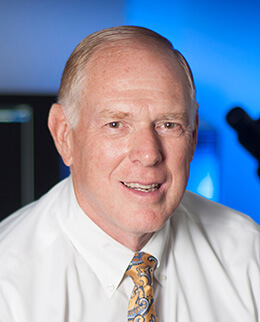August 3, 2021:
Purdue Center for Cancer Research (PCCR) scientist Philip Low, PhD, Presidential Scholar for Drug Discovery and Ralph C. Corley Distinguished Professor of Chemistry – Biochemistry (Department of Chemistry) at Purdue University.
The latest research update from Dr. Low is the design, synthesis, and patenting of PSMA-617, an investigational PSMA-targeted radioligand therapy for metastatic castration-resistant prostate cancer. It began with a PCCR collaboration including Dr. Low, Timothy Ratliff, PhD, and Tom Gardner, MD, from Indiana University School of Medicine, who ran the first clinical imaging trial, funded by PCCR, to show the targeting agent was highly prostate cancer specific.
After completion of phase II clinical trials, the therapeutic applications of the technology were sold by Endoctye Inc., a company started by Dr. Low, to Novartis Inc., which conducted the pivotal phase III clinical trial in metastatic castration resistant prostate cancer patients. Submission of phase III data in the form of an NDA (new drug application) prompted a June 2021 FDA award of the drug at “Breakthrough Status,” a rare designation that identifies a drug that demonstrates a substantial improvement over currently available therapies in the treatment of a serious or life-threatening condition, which paved the way for the drug’s rapid approval. With this designation, the drug should be approved for public use this year. Moreover, because it significantly improves both overall survival and progression-free survival of advanced prostate cancer patients, it should rapidly become standard of care for treatment of prostate cancer in any patients whose cancer cannot be completely removed by surgery.
Dr. Low’s research interests include the design of ligand-targeted drugs, tumor-targeted dyes for fluorescence-guided surgery of cancer, and development of novel immunotherapies for cancer, among others. He received his doctoral degree from University of California, San Diego.
Three things people may not know about Dr. Low:
- He grew up in West Lafayette, where his father was also a professor at Purdue University.
- He played basketball for West Lafayette High School and one year on the Brigham Young University basketball team.
- He has visited all seven continents and many different countries on each continent, except Antarctica, which has no country.
About the Big Ten Cancer Research Consortium: The Big Ten Cancer Research Consortium was created in 2013 to transform the conduct of cancer research through collaborative, hypothesis-driven, highly translational oncology trials that leverage the scientific and clinical expertise of Big Ten universities. The goal of the Big Ten Cancer Research Consortium is to create a unique team-research culture to drive science rapidly from ideas to new approaches to cancer treatment. Within this innovative environment, today’s research leaders collaborate with and mentor the research leaders of tomorrow with the unified goal of improving the lives of all patients with cancer.
About the Big Ten Conference: The Big Ten Conference is an association of world-class universities whose member institutions share a common mission of research, graduate, professional and undergraduate teaching and public service. Founded in 1896, the Big Ten has sustained a comprehensive set of shared practices and policies that enforce the priority of academics in the lives of students competing in intercollegiate athletics and emphasize the values of integrity, fairness and competitiveness. The broad-based programs of the 14 Big Ten institutions will provide over $200 million in direct financial support to more than 9,800 students for more than 11,000 participation opportunities on 350 teams in 42 different sports. The Big Ten sponsors 28 official conference sports, 14 for men and 14 for women, including the addition of men’s ice hockey and men’s and women’s lacrosse since 2013. For more information, visit www.bigten.org.















Subscribe to the Big Ten CRC Newsletter X
X Facebook
Facebook YouTube
YouTube